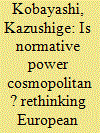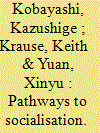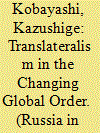|
|
|
Sort Order |
|
|
|
Items / Page
|
|
|
|
|
|
|
| Srl | Item |
| 1 |
ID:
178692


|
|
|
|
|
| Summary/Abstract |
Despite the apparent consensus that European Union (EU) normative power embodies a Kantian cosmopolitan approach to world politics, such a consensus is typically presupposed by scholars, rather than being critically examined by them. By offering macro-historical reflections, this article argues that EU normative power deviates from the Kantian cosmopolitan ideal and in fact replicates the Hobbesian logic of normative homogenization. Renouncing the medieval Vatican’s ambition to construct a united Europe anchored in uniform normativity, Kantian theory celebrates multiple normalcy as the basis for human freedom, perpetual peace, and mutual transformation. In contrast, Hobbesian theory is driven by the conviction that a peaceful value-based community could be built only through normative homogenization, behavioural conformism, and moral unity. In Hobbesian theory, the Leviathan exercises a transformative power to socialize others, eliminate discords, and build a commonwealth through norm diffusion and public education. In this vein, the EU’s aspiration to build a normatively homogenous Europe seems to reflect Hobbes’s vision of normative unity, rather than Kant’s vision of cosmopolitan diversity. Should the EU aspire to pursue a cosmopolitan foreign policy, it needs to pay more attention to the power-political implications of its drive toward normative homogenization and shift its focus from socialization to mutual transformation.
|
|
|
|
|
|
|
|
|
|
|
|
|
|
|
|
| 2 |
ID:
185795


|
|
|
|
|
| Summary/Abstract |
This article problematises the status quo bias in IR socialisation research, and develops an alternative concept of competitive socialisation, through which subaltern actors internalise dominant norms, enhance their competitive edge, and enact more equalised power relations in global politics. The dominant strand of IR socialisation research mostly conceives of socialisation as a status-quo-oriented practice that reinforces the existing power hierarchy, such as teacher-student relationship. This has resulted in a one-sided theory neglecting the importance of proactive and self-directed socialisation efforts embarked upon by subaltern actors themselves. Based on an alternative sociological approach that defines socialisation as a practice of self-enhancement, this article develops the concept of competitive socialisation and articulates alternative pathways to the internalisation of dominant norms. It applies this framework to the cases of Chinese socialisation into the peacekeeping community, and Russia's socialisation into the multilateral development community. These case studies demonstrate that the holistic internalisation of dominant Western norms has enabled Beijing and Moscow to challenge the existing global power hierarchy. This, in turn, resulted in fundamental changes in their behaviours from initial norm rejection, to passive acceptance, and finally to active learning and norm internalisation.
|
|
|
|
|
|
|
|
|
|
|
|
|
|
|
|
| 3 |
ID:
184561


|
|
|
|
|
|
|
|